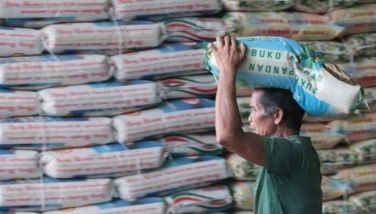DA tightens rules on meat imports
August 21, 2006 | 12:00am
The Department of Agriculture (DA) is tightening rules for the entry of imported meat products in the Philippines and will be requiring the accreditation of foreign meat establishments (FMEs) possibly by October in an effort to ensure that contaminated meat products do not find their way into the local market.
The National Meat Inspection Service (NMIS), an attached agency of the DA, is currently conducting public consultations for a draft administrative order (AO) entitled "Pre-Border Measures for the Export of Meat and Meat Products to the Philippines."
"We’re coming up with protocols for accrediting foreign meat establishments that are consistent with international guidelines to ensure that local consumers are protected, we want to ensure that contaminated meat products do not enter our ports," said NMIS Executive Director Minda S. Manantan, adding that the draft AO will also protect the domestic livestock and poultry industry.
Manantan said the new rules for FMEs will be incorporated in other proposed amendments to Department Administrative Order (DAO) 26, wherein existing exporters of meat and/or meat products to the country will have to be subjected to review and assessment of their accreditation status.
The draft DAO also specifies that only those FMEs recognized by, or under the inspection of the National Veterinary Administration (NVA) of the exporting country are qualified for DA accreditation to export to the Philippines.
Already, the draft DAO is worrying the European Commission (EC). In a letter to Agriculture Secretary Domingo F. Panganiban, EC Ambassador to Manila Jan de Kork said the EC has been taken aback since the DA has not even responded to earlier comments provided by the EC on the proposed draft order.
The EC said because of the lack of feedback from the DA, there is concern if the DA-NMIS has even considered the issues raised by representatives of the EC in previous consultations.
For one, exporting countries will have to get authorization from their respective national veterinary authority and will have to submit a long list of questionnaire outlining their protocols on risk management and will be required to fully cooperate with a DA Inspection Mission that will conduct on-site inspection and validation of import risk measures.
Mananatan said the agency’s proposed detailed protocols will also work in favor of local meat processing companies seeking to expand their exports of processed meat abroad.
"In the same manner that local consumers will benefit from our efforts, our own exporters will gain the confidence of other foreign countries in the local processed meat products for export that make use of imported meat as these will provide traceability," explained Manantan.
Currently, local meat processors, including several members of the Philippine Association of Meat Processors Inc. (PAMPI), import meat from various authorized foreign suppliers and use these for manufacturing meat products intended for the export market.
Manantan said NMIS want to beef up rules for accrediting foreign meat establishments whose products are exported to the Philippines.
These would be on top of the DA’s adoption of international standards such as those prescribed by the Animal Health Code of the Office International des Epizooties (OIE) and the Codex Alimentarius Commission.
The National Meat Inspection Service (NMIS), an attached agency of the DA, is currently conducting public consultations for a draft administrative order (AO) entitled "Pre-Border Measures for the Export of Meat and Meat Products to the Philippines."
"We’re coming up with protocols for accrediting foreign meat establishments that are consistent with international guidelines to ensure that local consumers are protected, we want to ensure that contaminated meat products do not enter our ports," said NMIS Executive Director Minda S. Manantan, adding that the draft AO will also protect the domestic livestock and poultry industry.
Manantan said the new rules for FMEs will be incorporated in other proposed amendments to Department Administrative Order (DAO) 26, wherein existing exporters of meat and/or meat products to the country will have to be subjected to review and assessment of their accreditation status.
The draft DAO also specifies that only those FMEs recognized by, or under the inspection of the National Veterinary Administration (NVA) of the exporting country are qualified for DA accreditation to export to the Philippines.
Already, the draft DAO is worrying the European Commission (EC). In a letter to Agriculture Secretary Domingo F. Panganiban, EC Ambassador to Manila Jan de Kork said the EC has been taken aback since the DA has not even responded to earlier comments provided by the EC on the proposed draft order.
The EC said because of the lack of feedback from the DA, there is concern if the DA-NMIS has even considered the issues raised by representatives of the EC in previous consultations.
For one, exporting countries will have to get authorization from their respective national veterinary authority and will have to submit a long list of questionnaire outlining their protocols on risk management and will be required to fully cooperate with a DA Inspection Mission that will conduct on-site inspection and validation of import risk measures.
Mananatan said the agency’s proposed detailed protocols will also work in favor of local meat processing companies seeking to expand their exports of processed meat abroad.
"In the same manner that local consumers will benefit from our efforts, our own exporters will gain the confidence of other foreign countries in the local processed meat products for export that make use of imported meat as these will provide traceability," explained Manantan.
Currently, local meat processors, including several members of the Philippine Association of Meat Processors Inc. (PAMPI), import meat from various authorized foreign suppliers and use these for manufacturing meat products intended for the export market.
Manantan said NMIS want to beef up rules for accrediting foreign meat establishments whose products are exported to the Philippines.
These would be on top of the DA’s adoption of international standards such as those prescribed by the Animal Health Code of the Office International des Epizooties (OIE) and the Codex Alimentarius Commission.
BrandSpace Articles
<
>
- Latest
- Trending
Trending
Latest
Trending
Latest
Recommended































